Lord Voldemort: Dissecting a Villain
Harry Potter is a very well known fantasy, children’s literature series. Part of what makes it so successful is the powerful villain that dominates the series: Lord Voldemort, the once boy Tom Marvolo Riddle. The quality and depth of characterisation that Voldemort receives is due to the fact that he is one villain spread across seven novels. Where usually each novel depicts a different villain, each acting as a new foil to the hero, instead J. K. Rowling choose to extend Voldemort’s backstory and return over the entire series. There are many different factors that influence the development and use of a villain in literature. What makes Voldemort so successful as a villain is that he meets numerous emotional and psychological aspects of the human experience without becoming undermined as a true evil-doer. This discussion covers a number of components that need to be considered when dissecting a villain: chronology, psychology, heritage, early years, narrative manipulation (Horcruxes and the prophecy), emergence for the final confrontation, and the inevitable end. Ultimately this should reveal the depth of character and fascinating construction of a true villain.
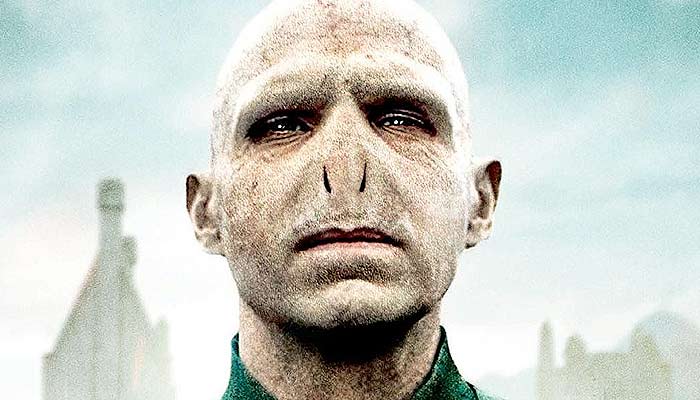
Chronology of a Life
In brief: Tom Marvolo Riddle was born in 1926 on New Year’s Eve. His mother died giving birth to her son, living only long enough to name him (for his father and maternal grandfather). Riddle grew up at Wool’s Orphanage, unaware of his heritage until aged 11 when he received the invitation to Hogwarts from Dumbledore. 1 He was educated at Hogwarts from 1938 to 1945. Finishing his education it is believed he travelled to Albania. Upon return to Britain he was offered positions in the Ministry for Magic, but interestingly declined, perhaps concerned of the closer scrutiny he would receive there. Instead he took a job working at Borgin and Burkes where he “persuaded” people to part with their valuable magical objects. 2 He then vanished, only to reappear and apply again for the position of Defence Against the Dark Arts professor. Following another rejection for this role Riddle disappeared, and instead in the 1970s Lord Voldemort emerged, gathering followers named Death Eaters.
Voldemort at the height of his power disappears, many believed he was killed by the backlash when he attacked baby Harry. He maintained life in the forests of Albania only through his construction of Horcruxes. He first emerges by taking the bodies of snakes, and eventually sharing a form with Professor Quirrell, but he is thrust out of that form. It is in 1994 when Peter Pettigrew finds and serves him that his path back to power begins. Using teenage Harry’s blood in a ritual, Voldemort is reborn in his final monstrous form. Unable to kill Harry, Voldemort and the Death Eaters become once again active in the wizarding world. Voldemort, finding his and Harry’s wands shared a common thread, decides to seek out the famous Elder Wand, which he finally takes from Dumbledore’s grave. Voldemort then realises Harry and his friends have begun to destroy Horcruxes and returns to Hogwarts to wage a final battle. Demanding Harry offer himself in place of all the other student’s lives, he kills Harry in the woods and proclaims his death. However, Harry is restored and a final duel is fought where Harry uses the fact that he was the true master of the Elder Wand (an interesting technicality) to cause the Killing Curse to rebound on Voldemort. Meaning that ultimately Voldemort destroyed himself. All of this reads as a simple factual overview of plot and events, but when considered through the lens of further discussion it reveals a number of interesting and important characterisation factors.

Purpose of a Villain
A villain is deliberately designed to counter the protagonist, not only acting as an antagonist to drive the character’s narrative, but also as a foil to highlight positive character growth of the hero. This is a concept that is famously explained by Jung as the shadow. 3 The shadow is a vital aspect of finding balance, which is often used in narratives where the purpose of the villain causes an imbalance in the world that the hero must resolve. 4 For every step forward that Harry would take as a hero, this would be reflected in the stagnation of Voldemort. For instance, although Voldemort acknowledged his own mistakes at different times, he did not learn from them. 5 While Harry began to learn to plan, to make decisions and act calmly, Voldemort would undermine his own position of power by allowing emotion to influence his decisions when intellectually he would have known such acts reduced the likelihood of success. Harry’s morality is established very early when he deliberately chooses to not be associated with Slytherin, wanting to be a “good” wizard. 6 In contrast, Riddle seeks out his Slytherin and pure-blood heritage, unconcerned about concepts of right and wrong. In fact the inclusion of Riddle’s early years through the memories Dumbledore has curated, and the incursion of the diary Horcrux help to present (shadow) the contrasting positive and “good” choices and actions of Harry. Although not the only role of the villain, acting as a foil and shadow to the hero is their narrative purpose.
Next in consideration is the purpose and choice of a name. The power of a name is a vital part of a villain, and a long honoured part of literary narratives. Lord Voldemort is an anagram for T. Marvolo Riddle, a literal desire for him to reinvent himself in a new form. He was also given appropriately mysterious titles that were designed to evoke fear in the wizarding world: “You-Know-Who,” “The Dark Lord” and “He-Who-Must-Not-Be-Named.”
I, in whose veins runs the blood of Salazar Slytherin himself, through my mother’s side? I, keep the name of a foul, common Muggle, who abandoned me even before I was born, just because he found out his wife was a witch? No, Harry. I fashioned myself a new name, a name I knew wizards everywhere would one day fear to speak, when I had become the greatest sorcerer in the world!
—Tom Riddle’s transformation into Lord Voldemort. 7
The characteristics of a villain are many and varied, but a key factor is the demonstration of a monstrously terrible act that solidifies the position of the villain. This exact act will vary in level depending on the narrative. Interestingly for a children’s/young adult’s series such as Harry Potter, the acts of the villain are as horrific as those seen in adult literature. Key among this is that Voldemort attempted to kill a baby; the killing of children is chilling, but the murder of infants is often a huge taboo. 8 The fact he does not succeed does not undermine the intent.
Other than murder and vicious disregard for the rights of others, he also demonstrated flawed personality characteristics often associated with villains. He was extremely obsessive in nature. Early reference is made to his childhood where he collected trophies from those he bullied. Later his obsession with staving off death drove him to his discovery and production of Horcruxes. His fixation on Harry Potter, and then his pursuit of the Elder Wand all tie back to his tyrannical obsessive actions. Like many other villainous characters it is such flaws and paranoias that bring about what they most fear, for Voldemort it is death, numerous times. 9
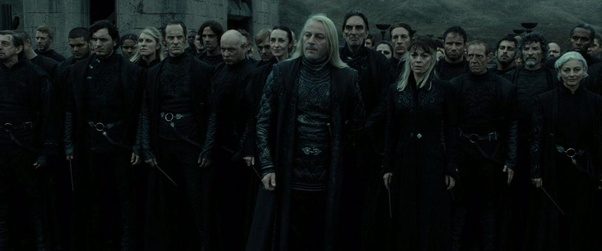
Nature versus Nurture
Nature versus nurture, regardless of its real world actuality is a common trope in literature. The concept concerns whether human nature is driven by innate biological forces or the product of learning and environment. 10 This debate of whether evil is born or influenced by early childhood or environmental factors continues to be engaged in, and many thriller/murder-mystery/serial-killer novels deal with this question. A number of common scenarios are ones that will present where a villain has been placed in completely different situations, and his personality either changed due to circumstances (nurture) or retained his evil nature (nature). 11 Villain mindsets are often linked back to an aspect in their childhood, however, it is at times difficult to identify whether their experiences arose due to circumstance alone or were set on that path or exasperated by pre-set personality characteristics.
The argument of whether Riddle developed into Voldemort due to his situation or his inherent self is an interesting one. There is a lot in his family background, especially his connection to Salazar Slytherin that suggests an inherent predestination towards evil. However, that is also based on the belief that Slytherin is evil, which is too cut-and-dry especially when considering the occurrences in Harry Potter and the Cursed Child. It is often argued that because he was birthed under enchantment, a symbolic way of showing he came from a loveless union, he is incapable of understanding love. 12 Extrapolating from this is that the manner of his birth predetermined all his characteristics, leading him to become a creature that understands only coercion and manipulation. It is also suggested that if Merope had lived to raise her son Voldemort would never have existed, however, this is only speculation. 13 This suggests that his psychological development was shaped by his mother’s death and his father’s abandonment. 14 That by being raised in an orphanage, and unable to engage in healthy psychological development he was unable to integrate into society, which can all be linked to choices influenced by his family history. 15
Yet Riddle also conforms to many stereotypes of a serial killer that are around his unhappy, lonely upbringing as an unwanted orphan: the ability he had through magical and intellectual means to control and bully other children, he was a consummate liar, and he tortured animals. 16 He also collected trophies – “These were taken from victims of his bullying behaviour, souvenirs, if you will, of particularly unpleasant bits of magic.” 17 A habit that ties in later with his use of Horcruxes, and leans heavily into the trope of serial killers. He is shown throughout his childhood to be ruthless, cruel and sadistic. He has the same level of mercy for his followers as his enemies, and appears to feel no desire or need for human companionship. 18 He also presents a need for independence that is pathological, choosing based on his perceived upbringing to operate in secrecy and solitude that borders on the paranoid.
Voldemort is motivated by a number of differing factors, some that stem from his childhood and lack of love, an awareness of his diluted bloodlines, which also become a primary factor he uses to influence others to his cause – concepts of racial cleansing and superiority. But others, such as his self-hatred stem from an internal understanding of his failings. Voldemort’s “platform” centred on the superiority of “pure-blood” wizards is especially ironic as he himself comes from mixed blood. During adolescence he already begins to act with violence against muggle-born students; those who acted as reminders of his own heritage. 19 Such connections position Voldemort within the framework of real historical figures, such as Adolf Hitler. 20 He devolves rapidly from a brilliant, but consciousless wizard seeking immortality into a power-obsessed megalomaniac. The answer of nature versus nurture is a difficult one to identify as much of Rowling’s descriptions tie back to his childhood, but also to his family heritage that he did not discover until his late teens, which implies it could be a mixture of both. However, the choices he makes in the face of acceptance and opportunity that he received at Hogwarts could suggest it was a case of nature.
Family Background
Riddle’s mother was Merope Gaunt, a direct descendant of Salazar Slytherin, and his father was a muggle, Tom Riddle Sr. Merope magically tricked Tom Sr. into marrying her, but released the spell hoping he would fall in love with her – he did not. 21 Tom Sr. abandons his family on the streets of London after the spell is lifted, leaving Merope to give birth, with no interest in his son’s fate. Merope’s heritage for Riddle is an ancient line of wizards. The House of Gaunt were an ancient, and formerly wealthy wizard family. It was also noted for producing violent and unstable personalities, suggested due to inbreeding in a desire to maintain the purity of the line. 22 Marvolo Gaunt (Merope’s father and family patriarch) considered himself the last known male, pure-blood descendent of Slytherin and as such considered himself royalty – regardless of his poverty, squalor, lack of education and evidence of mental and physical disorders. He is the tyrant in his own home, and is abusive to Merope, a situation that could be inferred to suggest that regardless of if she had lived Voldemort would still have emerged from this unhealthy patriarchal family. 23 In contrast Tom Riddle Sr. was a very wealthy muggle living in a manor near the shack of the Gaunts. Although his actions cannot be defamed for reacting poorly to being placed under a spell, his actions in relation to the disregard of his unborn child suggest a particular lack of empathetic characteristics.
The Choices of a Lonely Teen
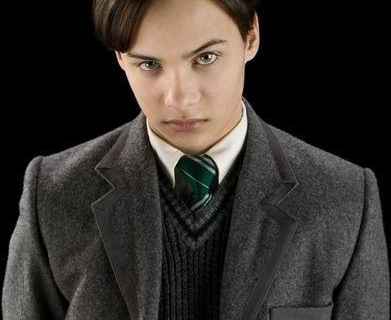
Hogwarts became a period of vital importance to Riddle. He was placed in Slytherin, which echoed his own family history but also situated him within a particular “category” of expected evil. During summer breaks Riddle was forced to return to the muggle orphanage, which he hated. 24 Although in his early years at the orphanage he demonstrated classic characteristics of a serial killer, using fear and manipulation to control and steal from his fellow orphans. Including the allusion to a particularly horrific act he committed in a coastal cave with two other orphans. 25 At Hogwarts he presented a façade of being a model student, even becoming a prefect, Head Boy and received a medal for magical merit. 26 He was also described as a very handsome boy, with jet black hair, perfectly carved features and dark eyes, with a matching charisma to draw followers. The first of his Death Eaters were Slytherin students that he gathered to him during his time at the school. Although Riddle referred to them as friends, it was clear that to him they were only servants and he made no connections to others on an emotional level. His only emotional connections seemed to be to objects and places.
However, during his final years Riddle began to research his family and discovered his connection to Salazar Slytherin, which also lead him to locate the entrance to the Chamber of Secrets and using his unique power as a Parselmouth to control the basilisk. A creature he willingly released into the school, eventually killing a student: Myrtle Warren. 27 Although not the first death he caused, it is the first the lead to him needing to engage more fully in subterfuge. Due to Myrtle’s death and the teacher’s inability to find the creature, Hogwarts was at risk of closing, which meant Riddle would have been sent back to the orphanage for an indeterminable time. To resolve this he framed Rubeus Hagrid for the crime and closed the Chamber.
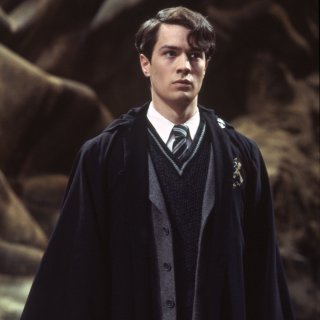
Perhaps one of the most disturbing acts of his teen years was when Riddle found his family home, in Little Hangleton, and killed the remaining three Riddles, then implanted a false memory in his uncle Morfin Gaunt to take the blame. 28 This act not only showed a soul deep anger focused on his family, it also reinforced his brilliance as a tactician and his ability to coldly think through acts of unbelievable violence. It becomes clear that he is a highly manipulative character, able to present a flawless façade that hides his evil from others unless he wishes to reveal it. 29 This is especially present in his interactions with Dumbledore where Riddle is courteous, but not from a place of respect, but rather in a desire to gain what he needs from the situation. 30 Following graduation, Riddle actually wanted to remain as a teacher at the school, but was deemed too young. The importance that Hogwarts played in his life, and in his developing sense of identity shows that for a glimmer of time he had an opportunity for redemption, to find a better path under the watchful gaze of Dumbledore. Although he displays reprehensible behaviour he also appears redeemable prior to leaving school. 31 It can be argued that Riddle rejected his last change for redemption by framing Hagrid, however, he did seek to remain at the school, which was his place of strongest stability.
The Horcruxes
A Horcrux is the attempt to beat death by concealing part of the soul in an object. The act of splitting the soul is a violation of the self, almost an action of pure self-hatred, and requires an event of extreme evil, such as murder. The first time Riddle was introduced to the idea of the Horcruxes by Professor Horace Slughorn, who Riddle tricked into revealing the information, he immediately begins to comprehend the power inherent in the act. 32 However, Slughorn shares an equal blame in not only imparting this information, but elaborating on the concept and framing Riddle’s interest as evidence of his unique mind. The fact that Slughorn buried and hid the memory so deeply that Dumbledore had to resort to using Harry to draw the truth forth, alludes to the fact that Slughorn too recognised that he had started Riddle on the path to becoming Voldemort. However, the desire for immortality was already in place from an early age and tied to his mother’s death. A young Riddle argued to Dumbledore that his mother could not have been a witch, or else she would not have died. 33
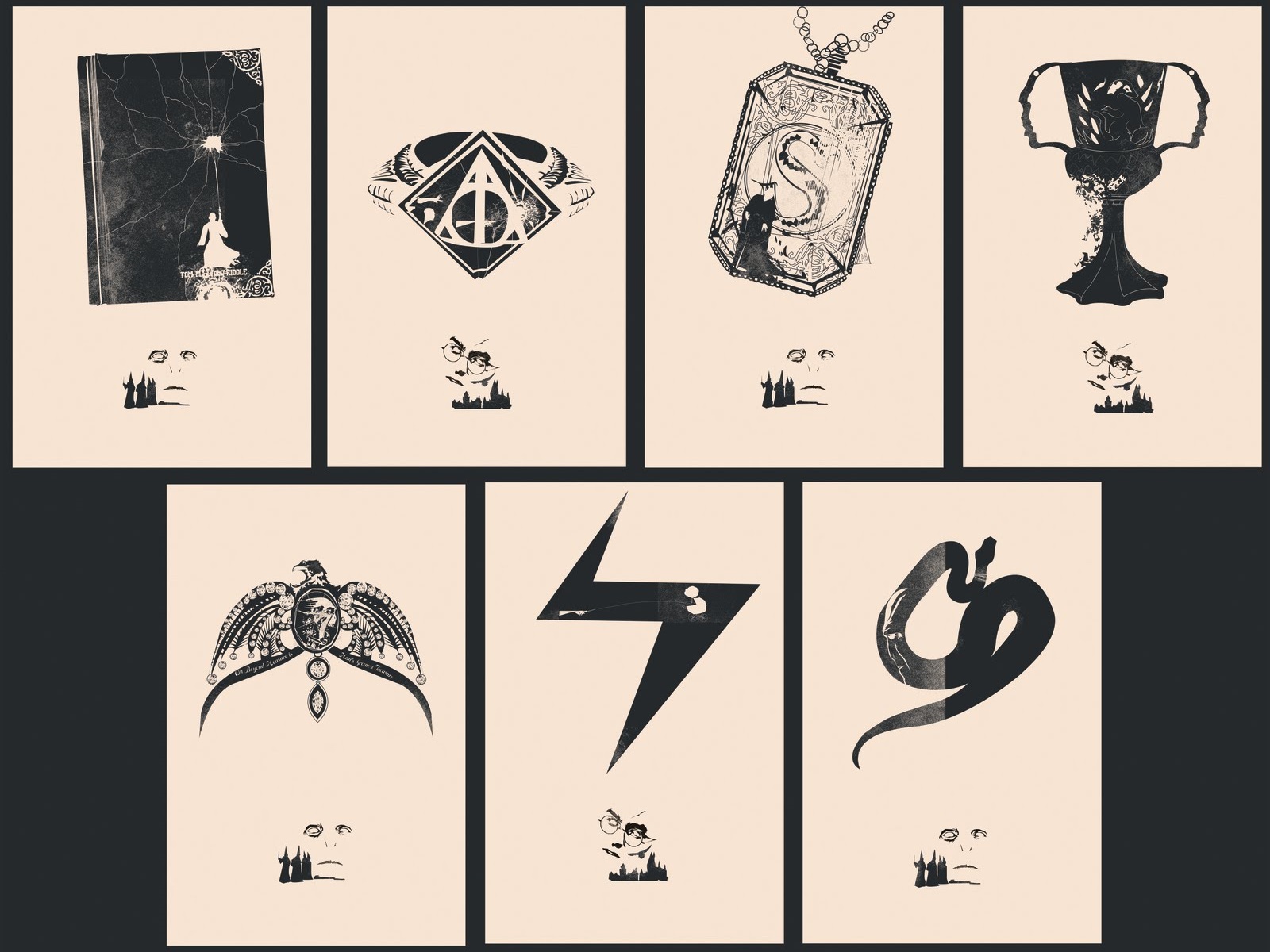
In total Voldemort creates eight Horcruxes. The first, a diary Riddle utilised as a Horcrux also preserved part of his adolescent identity, an incredibly patient, manipulative and brilliant villain. Not only did the tool allow for the Chamber of Secrets to be reopened and wreak havoc on the school, it also ensured that it did so with a maximum amount of emotional and psychological damage to the user, and drew on racist fears within the wizarding community. He then creates one in the bloodshed of the Riddle family massacre using Marvolo Gaunt’s Ring. The next Horcrux was Rowena Ravenclaw’s Diadem. It is an insightful choice, selected to undermine the purity of an object of iconography held in high esteem, it was also a choice that would ensure that piece of his soul is protected as an object of such historical value would always be protected. He retrieved two more Hogwarts artefacts, Salazar Slytherin’s Locket and Helga Hufflepuff’s Cup, to turn into Horcruxes. The next was unintentional, Harry Potter himself became a Horcrux when Voldemort attempted to kill him as a baby, and was part of why Harry could see into his mind and can use Parselmouth. Following this is a temporary Horcrux when he takes form in Quirrell, which is also often contested as not being a true Horcrux, but rather the embodiment of the remaining piece of Voldemort’s soul that he himself was in direct control of. The final one in the time of his return is the one he creates in his snake-familiar Nagini. Each choice is significant in its own way and offers further insight into the character of Voldemort. He could have chosen every-day meaningless objects, but instead chose to privilege certain artefacts, especially those related to Hogwarts, thus reinforcing both his god-complex and his obsessive nature that allowed emotion to overwhelm intellect.
The Problem with Prophecy
Although the flaws present within Riddle are at the heart of Voldemort’s downfall, the path was rapidly increased by his interpretation of the prophecy that underlies the narrative of the Harry Potter series. The prophecy that drew Harry into the narrative was delivered by Sybill Trelawney during an interview with Dumbledore and made its way to Voldemort who interpreted it as concerning the threat of the new born child of James and Lily Potter. He had also only heard half the prophecy. Interestingly it is later discussed that the prophecy could easily have also referred to Neville Longbottom. The prophecy was:
The one with the power to vanquish the Dark Lord approaches/
Born to those who have thrice defied him, born as the seventh month dies/
And the Dark Lord will mark him as his equal, but he will have power the Dark Lord knows not/
And either must die at the hand of the other for neither can live while the other survives.
As expected, every interaction taken around avoiding the prophecy simply ensures the prophecy’s consequences. Voldemort’s first act by choosing to target Harry highlights his own insecurities about his heritage as a muggle-born. He perceives Harry as more of a threat, which is interesting as one who supports the superiority of the pure-blood he should have selected Neville as the greatest threat, but understands internally that the greatest threat comes from within, and Harry was closer to his self-hood. 34 Harry reminds him of his own weaknesses, and rather than make the optimal decision he responds emotionally.
Many of the difficulties Voldemort faced around his first defeat, and later his engagement with Harry, arose from the incomplete version of the prophecy he heard. Once he regained power openly he began to attempt to seize the original record of the prophecy. Tricking Harry into retrieving it as only those involved in the prophecy could access it, it is instead destroyed in the fight. Following this assault on the Ministry Voldemort then decides to begin the Second Wizarding War and attacks by Voldemort’s army began, an act that also works to unite his enemies, which provides support to Harry. Thus we begin to see that each choice Voldemort makes leads him closer and closer to his own downfall.
Rebirth of a Monster
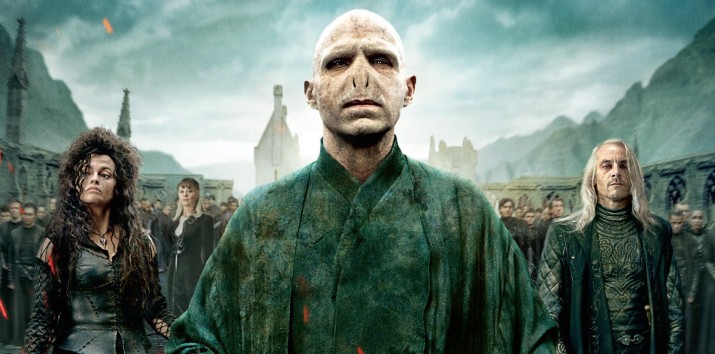
Voldemort is an irredeemable villain. There has been a rise in the popularity of the tortured bad guy, one who has experienced hardships and made hard choices, who might be saved, but time runs out. 35 Voldemort is not this type of hero, he emerges with a clear goal, to kill Harry Potter, and does not waiver from this choice or from the deaths of those who stand in his way. The final form of Voldemort is truly a monster, stripped of many human characteristics. He appears finally as skeletally thin, his face opaque, with deep, dark scarlet eyes set in slits, and his nose is flat as a snake’s.
In many ways the rebirth of Voldemort was a continuation of his previous trajectory. He had already begun the First Wizarding War, where he gathered followers to him with the belief that wizards should have the right to dominate muggles and those muggle-born. He encouraged his followers to use Unforgiveable Curses, to kill mercilessly and indiscriminately. The height of his power came with his skill at Legilimency, which is the ability to read, control and unhinge the minds of others, a power of truly villainous level. Not only was death the resolution to an encounter with the Dark Lord, but a more painful and torturous option became the greater threat, that before death would come invasion and madness. 36 He also gathered to him creatures associated with darkness and evil, both generally in mythology, and within the narrative world. All of these acts solidifies his position as an irredeemable villain, striping away any empathetic concern of Harry or others, making it easier to understand that the only solution is to ensure his death.
An Inevitable End
Rowling sets the inevitable end of Voldemort from the start. His evil is grounded in comprehensible flaws, and she seems to suggest that to defeat evil we need to not only fight it, but understand where it comes from first. 37 That Voldemort literally and symbolically destroys himself is a powerful part of the narrative. He selects Harry, giving him the power to not only protect himself from Voldemort, but to defeat him in numerous ways. He gives greater power to Harry in numerous ways through each of their interactions that undermine his own strengths. Then finally he casts the spell that kills himself because in his arrogance he cannot believe he can be defeated. He is a greatly flawed character, unable to see beyond his narrow focused interest only in the usefulness of people, objects and powers in his goals. 38 Whether Riddle could have been saved if he was placed in a better situation, or if from birth he was destined to be Voldemort, his personality and choices set him firmly on the path of villainhood. The obsession with eluding death, mimicked in the story of the Hallows, is clearly signposted from the beginning as ultimately futile. Each step forward that he takes can be perceived as another foot on the path to his own destruction, ultimately at his own hand. From the beginning Lord Voldemort faced an inevitable defeat, but this does not diminish his role as one of the most terrifying and well developed villains.
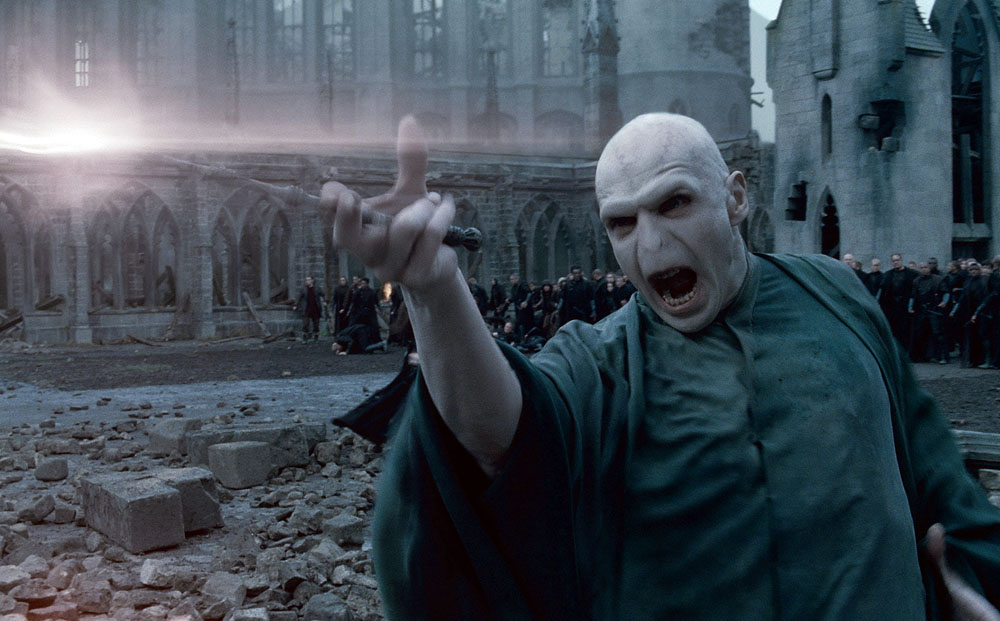
Works Cited
- Lord Voldemort. (n.d.). Villains Wiki. Retrieved from http://villains.wikia.com/wiki/Lord_Voldemort ↩
- Lord Voldemort. (n.d.). Villains Wiki. Retrieved from http://villains.wikia.com/wiki/Lord_Voldemort ↩
- The Fight Against Apathy. (2015). Jung and Harry Potter. Sapere Aude. Retrieved from https://bradleyallsop2.wordpress.com/2015/01/20/jung-and-harry-potter/ ↩
- The Fight Against Apathy. (2015). Jung and Harry Potter. Sapere Aude. Retrieved from https://bradleyallsop2.wordpress.com/2015/01/20/jung-and-harry-potter/ ↩
- Tom Riddle. (2018). Harry Potter Wiki. Retrieved from http://harrypotter.wikia.com/wiki/Tom_Riddle ↩
- Isaacs, B. (2012). I may not know who I am, but I know who I’m not: Self-awareness and actualisation in the Harry Potter series. The Looking Glass: New Perspectives on Children’s Literature, 16(1), 1. Retrieved from https://www.lib.latrobe.edu.au/ojs/index.php/tlg/article/view/280/277 ↩
- Rowlings, J.K. (2002). Harry Potter and the Chamber of Secrets. ↩
- Lindelor, D. (2011). Harry Potter’s Lord Voldemort: Why he’s the baddest villain ever. The Daily Beast. Retrieved from https://www.thedailybeast.com/harry-potters-lord-voldemort-why-hes-the-baddest-villain-ever ↩
- Tom Riddle. (2018). Harry Potter Wiki. Retrieved from http://harrypotter.wikia.com/wiki/Tom_Riddle ↩
- Rettew, D. (2017). Nature versus nurture: where we are in 2017. Psychology Today. Retrieved from https://www.psychologytoday.com/au/blog/abcs-child-psychiatry/201710/nature-versus-nurture-where-we-are-in-2017 ↩
- Haece, M. L. (2015). Villains and other misunderstood individuals. Maverick Youth. Retrieved from http://www.maverickyouth.com/articles/villains-misunderstood-individuals/ ↩
- Tom Riddle. (2018). Harry Potter Wiki. Retrieved from http://harrypotter.wikia.com/wiki/Tom_Riddle ↩
- Pottermore Team. (n.d.). The sad history of Merope Gaunt. Pottermore. Retrieved from https://www.pottermore.com/features/the-sad-history-of-merope-gaunt ↩
- Isaacs, B. (2012). I may not know who I am, but I know who I’m not: Self-awareness and actualisation in the Harry Potter series. The Looking Glass: New Perspectives on Children’s Literature, 16(1), 1. Retrieved from https://www.lib.latrobe.edu.au/ojs/index.php/tlg/article/view/280/277 ↩
- Isaacs, B. (2012). I may not know who I am, but I know who I’m not: Self-awareness and actualisation in the Harry Potter series. The Looking Glass: New Perspectives on Children’s Literature, 16(1), 1. Retrieved from https://www.lib.latrobe.edu.au/ojs/index.php/tlg/article/view/280/277 ↩
- Beck, J. (2015). The psychology of Voldemort. The Atlantic. Retrieved from https://www.theatlantic.com/entertainment/archive/2015/09/the-psychology-of voldemort/406162/ ↩
- Beck, J. (2015). The psychology of Voldemort. The Atlantic. Retrieved from https://www.theatlantic.com/entertainment/archive/2015/09/the-psychology-of voldemort/406162/ ↩
- Tom Riddle. (2018). Harry Potter Wiki. Retrieved from http://harrypotter.wikia.com/wiki/Tom_Riddle ↩
- Isaacs, B. (2012). I may not know who I am, but I know who I’m not: Self-awareness and actualisation in the Harry Potter series. The Looking Glass: New Perspectives on Children’s Literature, 16(1), 1. Retrieved from https://www.lib.latrobe.edu.au/ojs/index.php/tlg/article/view/280/277 ↩
- Beck, J. (2015). The psychology of Voldemort. The Atlantic. Retrieved from https://www.theatlantic.com/entertainment/archive/2015/09/the-psychology-of voldemort/406162/ ↩
- Lord Voldemort. (n.d.). Villains Wiki. Retrieved from http://villains.wikia.com/wiki/Lord_Voldemort ↩
- Tom Riddle. (2018). Harry Potter Wiki. Retrieved from http://harrypotter.wikia.com/wiki/Tom_Riddle ↩
- Isaacs, B. (2012). I may not know who I am, but I know who I’m not: Self-awareness and actualisation in the Harry Potter series. The Looking Glass: New Perspectives on Children’s Literature, 16(1), 1. Retrieved from https://www.lib.latrobe.edu.au/ojs/index.php/tlg/article/view/280/277 ↩
- Lord Voldemort. (n.d.). Villains Wiki. Retrieved from http://villains.wikia.com/wiki/Lord_Voldemort ↩
- Tom Riddle. (2018). Harry Potter Wiki. Retrieved from http://harrypotter.wikia.com/wiki/Tom_Riddle ↩
- Lord Voldemort. (n.d.). Villains Wiki. Retrieved from http://villains.wikia.com/wiki/Lord_Voldemort ↩
- Tom Riddle. (2018). Harry Potter Wiki. Retrieved from http://harrypotter.wikia.com/wiki/Tom_Riddle ↩
- Lord Voldemort. (n.d.). Villains Wiki. Retrieved from http://villains.wikia.com/wiki/Lord_Voldemort ↩
- Tom Riddle. (2018). Harry Potter Wiki. Retrieved from http://harrypotter.wikia.com/wiki/Tom_Riddle ↩
- Collins Smith, A. & Smith, O. M. (2012). Voldemort Tyrannos: Plato’s tyrant in the Republic and the wizarding world. Reason Papers, 34(1), 125-136. Print. ↩
- Collins Smith, A. & Smith, O. M. (2012). Voldemort Tyrannos: Plato’s tyrant in the Republic and the wizarding world. Reason Papers, 34(1), 125-136. Print. ↩
- Lord Voldemort. (n.d.). Villains Wiki. Retrieved from http://villains.wikia.com/wiki/Lord_Voldemort ↩
- Tom Riddle. (2018). Harry Potter Wiki. Retrieved from http://harrypotter.wikia.com/wiki/Tom_Riddle ↩
- Isaacs, B. (2012). I may not know who I am, but I know who I’m not: Self-awareness and actualisation in the Harry Potter series. The Looking Glass: New Perspectives on Children’s Literature, 16(1), 1. Retrieved from https://www.lib.latrobe.edu.au/ojs/index.php/tlg/article/view/280/277 ↩
- Lindelor, D. (2011). Harry Potter’s Lord Voldemort: Why he’s the baddest villain ever. The Daily Beast. Retrieved from https://www.thedailybeast.com/harry-potters-lord-voldemort-why-hes-the-baddest-villain-ever ↩
- Tom Riddle. (2018). Harry Potter Wiki. Retrieved from http://harrypotter.wikia.com/wiki/Tom_Riddle ↩
- Beck, J. (2015). The psychology of Voldemort. The Atlantic. Retrieved from https://www.theatlantic.com/entertainment/archive/2015/09/the-psychology-of voldemort/406162/ ↩
- Tom Riddle. (2018). Harry Potter Wiki. Retrieved from http://harrypotter.wikia.com/wiki/Tom_Riddle ↩
What do you think? Leave a comment.











Jk Rowling’s mind is pretty dark.
I feel sorry for him. If only he was loved and taken care of, he’d have been a better person. He spent his life getting back at a world which rejected him.
I would have loved it much more if Harry would have died when voldemort hits him. How he survived the most powerful spell in wizarding world? even Dumbeldore himself couldn’t survive. It could have been more intense if they both would have died at the same time and Harry Potter saving the World by sacrificing himself.
You need to read all Harry Potter books to understand exactly why Harry survived the killing curse twice.
It’s ironic that despite being so obsessed with ancient secrets and myths, Voldemort never had a complete understanding of the Deathly Hallows.
Voldemort is my favourite character out of all the HP films, not ashamed to say that. He is so complex, powerful, ambitious and had such a tragic upbringing.
Despite he is a irredeemable villain? Is that what makes a good villain?
Your analysis makes me love the series even more. Thank you.
Always had been curious if JK Rowling thought of the story as a whole and add tidbits here and there or did she write everything spontaneously but kind of chronologically… HP IS SUCH A GENIUS WORK
He is a psychopath. It is said that he is unable to feel love, he absolutely lacks of empathy and he’s a narcissist and highly intelligent, all those things make him a psycho.
A psychopath is basically someone who lacks the ability to feel guilt when they do something wrong. They lack a conscience. A person doesn’t necessarily need to be intelligent to be a psychopath but he would definitely fit the criteria.
Voldemort was born with bad family genetics as well as being born under a love potion and being the heir of Salazar Slytherin so even if he was born in the best environment he would still be a psychopath…
Interesting! I had him down as a psychopath, rather than a sociopath though. Because I truly believe he’d have no remorse killing someone close to him. Like he found it a ‘pity’ to kill Severus Snape to gain control of the Elder Wand. In hindsight I found out he only needed to defeat the current owner of the Elder Wand in order to gain control over it. Which completely defeats the purpose of killing Snape. (Not that it helped him any, as it was Draco Malfoy who was the current wand owner.)
Harry was the actual owner of the Elder Wand; when he disarmed Draco at Malfoy Manor in Deathly Hallows, the Elder Wand recognized Harry as the new owner.
Great Article! Voldemort’s past has always been one of my favorite backstories. I love the way Rowling’s gradually demystified him in The Half Blood Print, which is my favorite potter book!
A great actor – his portrayla of Voldemort is superb. Also saw him in In Bruges the other night as Harry Waters – another brilliant villain.
Very interesting but better than Voldemort what about analysing Dumbledore?
Really enjoyed your take on Harry Potter/ Voldemort.
Voldemort isn’t evil because of any event in his life or any choice he has made, but because a magic plot device hard-wired him to be evil before he was even born. This means that all the events brought about by Voldemort throughout the series have more to do with the love potion than with Voldemort himself. The heroes are just fighting the after-effects of the love potion, rather than a villain with agency.
I find Voldemort attractive.
This reminds me of the good old days when I read HP over and over again!
jk rowling is a damn genius.
It’s sad how everyone are scared of him it isn’t really he’s fault that he became evil he had no parents to raise him if they were alive he probably wouldn’t be that evil he is my fav villain in the Harry Potter movies.
This makes me feel like reading the entire series again (which I do every year, anyway). Awesome article!
Lord Voldemort is a better character than Darth Vader. He’s better written, more interesting and more compelling.
We want a Voldemort solo film.
A solo movie about him would be awesome but to be honest it would have to be very dark almost rated R. It should explain maybe awful life traumatizing things done to him by men and women in the orphanage before he could reach a good amount of strength to properly use his powers, and he grows up hating both men and women whether it would be girls his age or grown women both whom would always be drawn to him but would learn to use that to his advantage. That’s how id imagine it.
If I were Voldemort, at this point, I’d simply get somebody else to stab or decapitate Harry to death. Surely not even a powerful charm could save you with your head separated from the body, right? But no. Voldemort simply had to go for him personally. And that cost him his life.
It’s easy to feel sympathy for Voldemort as he was growing up of course. No child deserves to never be loved. However, Harry was never loved growing up either and may have actually suffered MORE abuse in childhood than even Voldemort himself growing up, but it never stopped Harry from trying to do the right thing in the end.
Preach! As Dumbledore said “It is our choices that show us who we truly are, far more than our abilities”.
I really just came here to find out what happened to his nose. But ended up with a great article nonetheless. 😀
Very interesting piece. Entertaining but informational.
I learnt more about the whole story in this article then as to when I was watching the actual movies.
Voldemort needs a side movie!
A wonderful mini documentary of a very complex character. Well done!! I really enjoyed reading this!
Voldermort is a textbook psychopath.
I’ve only seen the first original Harry Potter movie, I’ve never been this confused in my life.
Kudos to your article on Voldemort! Really love the presentation, effort and overall creation.
Lord Voldemort was unable to feel love. Even his mother and father were in artificial love…
I love the way he was all about pure bloods and despised half bloods yet he was a half blood.
The books are really better than the movies, without even a shred of a doubt.
Nicely done. I’ve always thought that Voldermort’s inherent flaw was vanity. All those with a service-to-self mindset display the same symptom, plus they will never understand that the only way to progress is to relinquish the ego. What goes around, comes around. Thanks for your hard work. A fascinating read.
i dont like character voldermort in the movie because its different in the novel
Finally we get to know the story of Lord Voldemort… The details are incredible. It must have demanded a lot of research.
I feel like I understand the whole Harry Potter story much better after reading this! Thank you!
An enjoyable essay to read–particularly after remembering reading each of the Harry Potter books to my children.
Wow! Loved it! Compared to Umbridge, Draco, Snape, and other antagonistic HP characters, I always thought Voldemort was kind of boring. You know–serial killer, Wizard Hitler, pure evil, seen it a hundred times, yawn, yawn. But you pulled out some highly interesting things about him that lend a lot more depth and lead me to give Voldemort more credit. I love the concept of Voldemort as a “shadow” for Harry, and the fact that while Harry grows, Voldy stagnates. (I guess Peeves was a little wiser than we thought when he said, “Voldy’s gone moldy,” eh?) Anyway, super job.
I agree; there are many details that were nicely described. Make sure to read my comment below on another piece of information that was missed!
This is a good article. However, there were a few key points missing. Another reason Voldemort met his demise was because he could never understand (or at least try to), that even non-humans and objects have feelings that may be more powerful than him. For example, he did not bother to pay attention to wandlore; “The wand chooses the wizard”. It is clear that Voldemort thought that only by killing can one become the new leader/boss/etc. So he assumed Snape was the owner of the Elder Wand for killing Dumbledore. In the end, it was actually Draco who disarmed Dumbledore and whom the Elder Wand chose to recognize from then on. Once, Harry disarmed Draco though, the wand became Harry’s, thus making it impossible for Voldemort to kill Harry with that wand.
A well researched, insightful article into the characterisation of Voldemort, a very enjoyable read to those who are fans of Harry Potter, nice work!
Lord Voldemort has been always ambitious. J.K Rowling’s done an incredible job creating this whole wizarding world and each characters in it
Love your analysis of such a famous villain. Your point about his obsessive behavior adds another layer to his complex nature that I had not thought of before.
Loved reading your article, especially the sections about Voldemort’s upbringing and childhood! J.K. Rowling really did do an amazing job at creating Lord Voldemort’s character.
loved it
Great article – I love something that J.K Rowling said about Voldemort in an interview once:
Wait, actually, I really don’t remember the quote but pretty much she described him in his quest for immortality as a beast that consumed others’ lives to further his own.
Wow J.K Rowling sure knows how to make a villain. I love this
Very detailed and structured. Loved it.
The Philosopher’s Stone then acts as a double-mutual horcrux.
This was such a great read, thank you!